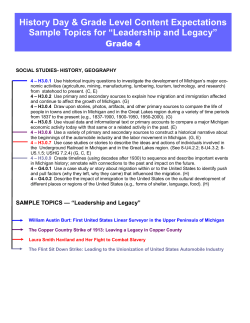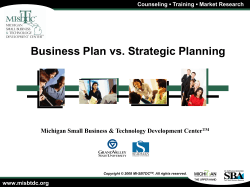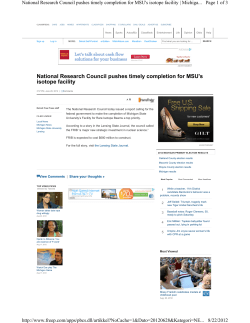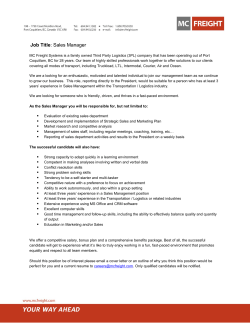
event partners - The Right Place
REGISTER TODAY! WHEN & WHERE: March 11, 2015 8:00 AM – 5:00 PM GVSU Eberhard Center 301 Fulton St. W, Grand Rapids, MI 49504 EVENT DESCRIPTION: The Midwest Supply Chain Management Conference is a comprehensive supply chain management education and networking event. This year’s conference will include leaders from industry, consulting and academia who will share practical experiences in: • Operations & Logistics • Growth & Innovation • Future Perspectives • Leadership & Development Continued change in the global economy has created new opportunities for supply chain professionals. Future success will be heavily influenced by the strategies, practices and processes that organizations put in place to facilitate innovation and operational excellence. As an individual or as an organization, you will walk away from this conference with positive energy and new ideas for the future. regonline.com/SCMC2015 KEYNOTE SPEAKERS INCLUDE: • Rick Mattoon, Senior Economist, Federal Reserve Bank of Chicago: The US and Midwest Economy in 2015: Implications for Supply Chain Firms • Tony Rubleski, President, Mind Capture Group Exceptional Mind Capture Customer Service WHO SHOULD ATTEND? Executives, managers and other individuals interested in learning more about integrated supply chain management strategies and how they can help transform the overall competitiveness of a business. Individuals with responsibility for product design/ engineering, procurement/sourcing, manufacturing/ operations, distribution/logistics, customer demand management, human resources and information technology will benefit from attending this conference. EVENT FEES: $225 early bird (ends February 20, 2015) $250 regular registration $195 group registration (3 or more people from same company) $35 student fee (Students must be enrolled full-time at a university. Call 616.771.0327 to register) EVENT AGENDA: 8:00 - 8:30 a.m. 8:30 - 8:45 A.M. Registration & Breakfast Welcome Remarks OPENING KEYNOTE: The US and Midwest Economy in 2015: Implications for Supply Chain Firms 8:45 - 9:45 A.M. Rick Mattoon, Senior Economist, Federal Reserve Bank of Chicago 10:00 - 11:00 A.M. CONCURRENT BREAKOUT SESSIONS - First Choice OPERATIONS & LOGISTICS GROWTH & INNOVATION FUTURE PERSPECTIVES LEADERSHIP & DEVELOPMENT 5 Metrics We Hate The Business Model Canvas and Lean Start-Up Methodologies Driving Supply Chain Stability and Efficiency Emotional Intelligence Randall Schaefer and Deb Smith, The Association for Operations Management J. Kevin McCurren and Timothy Syfert, Grand Valley State University 11:00 - 11:15 A.M. 11:15 - 12:15 P.M. Dave Lewandowski, Amway Kathy Lyall, Stryker Break CONCURRENT BREAKOUT SESSIONS - Second Choice OPERATIONS & LOGISTICS GROWTH & INNOVATION FUTURE PERSPECTIVES LEADERSHIP & DEVELOPMENT Yard Management Through Mobile Technology The Everything: The Journey of Owning Innovation Bending the Future Culture Eats Strategy... And How to Deal with It Eric Bentley and Blair Thomas, Columbian Logistics Network John Shull, Spectrum Health Todd Hart, Flow-Rite 12:15-1:15 P.M. Steve Melnyk, Ph.D., Michigan State University Lunch + Exhibitors KEYNOTE PRESENTATION: Exceptional Mind Capture Customer Service 1:15 - 2:15 P.M. Tony Rubleski, President, The Mind Capture Group 2:30 - 5:00 p.m. CONCURRENT WORKSHOPS - Third Choice OPERATIONS & LOGISTICS GROWTH & INNOVATION FUTURE PERSPECTIVES LEADERSHIP & DEVELOPMENT The Trend Toward Cost Transparency in The Supply Chain Seizing Integration - Procurement Business Alignment that Delivers Breakthrough Value Supply Chain Capabilities Negotiating Lessons, Tactics and Skills: Increasing Your Bottom Line by Improving How You Negotiate Ken Jones, Western Michigan University, Jeoff Burris and Adam Thor, Advance Purchasing Dynamics Matt Albin, Amway, June Kuiper, Evoqua Water Technologies, Mike Snider, Lacks Enterprises, Beverly Bekius, Magna Mirros of America REGISTER TODAY! EVENT PARTNERS: David J. Closs, Ph.D., Michigan State University regonline.com/SCMC2015 Michael Bloom, University of Michigan and Bruce Courtade, Rhodes McKee SESSION DESCRIPTIONS AND SPEAKER BIOS KEYNOTE SPEAKERS The US and Midwest Economy in 2015: Implications for Supply Chain Firms Rick Mattoon, Senior Economist, Federal Reserve Bank of Chicago Rick Mattoon Rick Mattoon is a senior economist and economic advisor in the economic research department of the Federal Reserve Bank of Chicago. Mattoon’s primary research focuses on issues that face the Midwest regional economy. Mattoon began his career at the Chicago Fed in 1990. In 1997, he left the bank to serve as a policy advisor for economic development, energy and telecommunications to the Governor of Washington. He later served as director of policy and legislation for the Washington Utilities and Transportation Commission. He returned to the bank in 2001. Rick’s work has appeared in the National Tax Journal, State Tax Notes, Public Choice and Society. He is the co-author of a chapter on state and local governments and the national economy in the Oxford Handbook of State and Local Government Finance. Rick serves on the Board of the Chicago Manufacturing Renaissance Council, the Advisory Committee to the Chicago Workforce Investment Council, the pension committee of the Civic Federation and is a member of the Joint Advisory Board of Economists to the Governor of Virginia. He also serves as a lecturer at the Kellogg School of Management at Northwestern University. Rick received a B.A. from Kenyon College and an M.A. from the University of Chicago. Exceptional Mind Capture Customer Service Tony Rubleski, President, Mind Capture Group Tony Rubleski Tony is currently the president of Mind Capture Group. His message is designed to help people ‘capture’ more minds and profits. He is an in-demand speaker who’s given hundreds of presentations the past decade, a strategic business coach, and global event promoter with over 20+ years of experience in the personal development industry. His second book in the Mind Capture series went #1 in three different business categories with Amazon.com and received stunning reviews from a wide range of leaders in marketing, sales, psychology to academia and multiple New York Times bestselling authors. Book #4 in the series titled, Mind Capture: Leadership Lessons from Ten Trailblazers Who Beat the Odds and Influenced Millions, will release in February of 2015. His work has been featured in various media outlets ranging from Bottom Line Magazine, The Detroit Free Press, the FOX TV network, ABC, to CNN Radio, NPR and Entrepreneur Magazine Radio. In addition, he has also served as a faculty member with both the U.S Chamber of Commerce and CEO Space International. EVENT PARTNERS: TRACK TOPIC: OPERATIONS & LOGISTICS FIVE METRICS WE HATE Randall Schaefer and Deb Smith, The Association for Operations Management What do typical metrics for inventory turns, PPV, shipping schedule attainment, capacity and cycle counting have in common? We hate ‘em! This presentation will explore how these metrics are too often misused, misaligned or just plain worthless. Yet, company after company embraces such metrics to measure supply chain professionals and business improvement. Learn to separate the good sense from the nonsense and focus on the right stuff. Randall Schaefer Randall Schaefer, CPIM, is an industrial philosopher, retired consultant and veteran speaker to APICS and other manufacturing based organizations. Randall is editor of the Lessons Learned feature in APICS magazine and contributing author of the Society of Manufacturing Engineers’ handbook, Material and Parts Handling in Manufacturing. Contact him at randallschaefer@att.net. Deb Smith Deb Smith is Product Information and Planning Manager for AGS Company, a Muskegon, Michigan based manufacturer of hard parts, chemicals and lubricants serving the Automotive, Industrial, Hardware and Mass Merchant industries. She has experience in a broad range of supply chains, including office furniture, automotive, recreation and aerospace. Deb is a contributing author of the Society of Manufacturing Engineers’ Handbook, Material and Parts Handling in Manufacturing, and is a frequent speaker at APICS events. YARD MANAGEMENT THROUGH MOBILE TECHNOLOGY Eric Bentley, General Manager of Transportation and Blair Thomas, Director of Customer Care, Columbian Logistics Network Learn basic principles of yard management and the importance of extending inventory visibility outside your four walls. This session will focus on how yard management software and off the shelf mobile technology can increase productivity with a real life implementation case study. The audience will learn: (1) principles of yard management as a discipline; (2) cost effective, off the shelf technology available for implementation; and (3) benefits and lessons learned from an actual live installation. Eric Bentley Eric Bentley is General Manager of Transportation for Columbian Logistics Network. In addition, Eric is responsible for company maintenance and safety programs. Prior to joining Columbian, he was a Senior Manager at FedEx Ground for fourteen years at the largest manual sort facility in the FedEx network. Earlier experience includes Allina Health and United Parcel Service. Eric holds an MBA from Cardinal Stritch University and a B.S. in Economics from the University of Wisconsin-River Falls. Blair Thomas Blair Thomas is Director of Customer Care at Columbian Logistics Network. He is responsible for Columbian’s customer facing corporate functions, including IT, Quality, and Marketing. His group serves as the project management office for new customer integrations, technology implementations, and internal improvements. Prior to joining Columbian, Blair held roles in operations, process improvement, and customer integration at DSC Logistics in Des Plaines, IL. He has a BS in Marketing from Miami University in Oxford, OH and an MBA concentrating in Organizational Leadership & Change Management from DePaul University in Chicago. EVENT PARTNERS: THE TREND TOWARD COST TRANSPARENCY IN THE SUPPLY CHAIN – WHY LEADING COMPANIES ARE GOING THERE AND THE TECHNIQUES THEY ARE USING – WORKSHOP Ken Jones, Director of Executive and Workforce Education and ISM Faculty, Western Michigan University Jeoff Burris, Founder and Principal, Advanced Purchasing Dynamics Adam Thor, Director, Cost Engineering, Advanced Purchasing Dynamics Understanding cost transparency or the true cost of the supplier manufacturing processes enables buyers to develop more collaborative relationships with suppliers, source before the engineers have completed the design of the products and establish pricing based upon mutually agreed criteria. The result is leaner supply chains, optimized cost in the design phase, and purchasing organizations that bring greater value to their companies. This workshop examines the trend toward cost transparency and presents a roadmap of how to get there. Participants will receive an understanding of true cost transparency tools, an assessment rubric to evaluate if their company is ready for true cost transparency, and an overview of the critical steps to implementation. Ken Jones Ken Jones is the Director of Executive and Workforce Education at Western Michigan University’s Center for Integrated Supply Management, and ISM faculty. In this capacity, Ken develops and manages the Bronco Force Initiatives currently consisting of customized training and educational solutions, university-resourced supply chain consulting teams, fast-track industry certifications, and K-12/community college outreach programs. Before shifting his focus to the education field, Ken was a supply chain management professional with 15 years of progressive leadership experience at Ford Motor Company, Rolls-Royce Aerospace, Roche Pharmaceuticals, and Hillenbrand Industries. Ken received a B.S. in finance and MBA in marketing and finance from Indiana University’s Kelley School of Business. In addition, he holds CPSM and C.P.M. designations with the Institute of Supply Management, and is a Six Sigma Black Belt. Jeoff Burris Jeoff Burris founded APD after spending 20 years in the automotive industry, where he became a recognized authority on procurement processes. Jeoff led purchasing teams at Ford Motor Company, Metaldyne and Intier Automotive Seating. At each assignment, he was able to consistently reduce procurement costs and significantly improve related processes. Jeoff has a Bachelor’s of Science in Supervision from Purdue University and an MBA in Operations from Indiana University. He remains a key figure in the world of procurement and global sourcing. Adam Thor As a Cost Engineering Director, Adam Thor uses his true cost modeling expertise to assist companies in understanding the cost structure of their material purchases. An effective trainer, Adam teaches buyers to fully comprehend supplier cost structures. Before joining Advanced Purchasing Dynamics, Adam honed his purchasing and cost engineering skills at manufacturing giants Lear Corporation and General Motors Corporation. As a cost engineer at Lear, his work focused on providing data-driven cost analysis to support purchasing decisions. Adam is a graduate of the University of Michigan with a Bachelor’s of Science in Industrial and Operations Engineering. EVENT PARTNERS: TRACK TOPIC: GROWTH & INNOVATION THE BUSINESS MODEL CANVAS AND LEAN START-UP METHODOLOGIES – ENTREPRENEUR TOOLS THAT CAN BE USED FOR STRATEGY DEVELOPMENT IN ANY ORGANIZATION J. Kevin McCurren, Executive Director of the Center for Entrepreneurship and Innovation at the Seidman College of Business, Grand Valley State University and President of e-merge West Michigan Timothy Syfert, Ph.D. Clinical Professor of Management in the Seidman College of Business, Grand Valley State University Are you an entrepreneurial spirit? Are you constantly thinking about how to create value and build new businesses for your organization? Are you trying to find innovative ways of doing business to replace old, outdated ones? Do you want to learn a new way to present your new business ideas? Whether a start-up, existing business or a new line of business within an existing business, the Business Model Canvas is a tool you can use to strategize and present your ideas in a quick, simple and visual format. This program will help supply chain managers easily identify the “who,” “what,” and “how” of implementing change. The “who” is the target audience(s), the “what” is the value provided and needs that are addressed by the product/service, and the “how” is what resources and activities are crucial in satisfying your customers.” J. Kevin McCurren J. Kevin McCurren is the Executive Director of the Center for Entrepreneurship and Innovation at the Seidman College of Business at Grand Valley State University in Grand Rapids, Michigan, USA. His responsibilities as the Executive Director include technology transfer for the university, GR Current, a community life science and technology incubator and e-Merge West Michigan, an economic development organization dedicated to supporting entrepreneurs in West Michigan. Kevin has over 25 years of combined corporate and entrepreneurial experience. As an entrepreneur he has been involved in the start-up of a medical management company, a dental laboratory company, several biomedical companies and not-for-profit start-ups. As an investor, Kevin has been involved in several angel investment groups and venture clubs. Kevin holds a Bachelor of Science and Master in Public Health and Health Services Management from the University of Missouri. Timothy Syfert, Ph.D. Timothy Syfert teaches organizational strategy and organizational development at Grand Valley State University to both undergraduate and graduate students. He also has over 25 years business experience in key strategic roles at Timex Watch Company, Haworth, Royal Consumer Business Products, Sherwin Williams, Roadway Express Trucking Company, and Johnson Controls. As a business consultant, he has assisted numerous profit and non-profit organizations with the facilitation of strategic analysis and planning activities. Companies have included large consumer products and businessto-business corporations as well as small to medium-sized manufacturing organizations. He has a Bachelor of Science degree in business from Oklahoma State University, a Masters in Business Administration in Strategic Planning from Rensselaer Polytechnic Institute, and a Doctorate in Organization Development from Capella University. EVENT PARTNERS: THE EVERYTHING: THE JOURNEY OF OWNING INNOVATION Todd Hart, Executive Vice-President, Flow-Rite Controls “Problem” is our favorite word; they smell like opportunity at Flow-Rite. What does our innovative process look like? Our first step is always to involve and encourage all of our team to identify and share problems and frustrations. We also empower (listen to) our customers or potential customers to submit ideas. Simple, right? It’s pretty messy, rarely straight forward, and hidden by other problems. So you have to dig a little and ask the QBQ (Question behind the Question). Once we’ve identified the problem we need to come up with a solution. We joke, the idea is the easy part. Now (that we have the idea) all we have to do is everything. This is where we stand out among our peers. We own “the everything.” The fact that we are able to own “the everything” is due to the amount of reinvestment in the company and more recently the people. Innovation requires implementation and when you own the implementation, you are able to make continuous improvements. You find the problems faster. You’re more intimately involved with the product, the customer, the distribution...”the everything.” A little secret in advance: you’ve likely sat just above Flow-Rite products and/or have Flow-Rite products within your supply chain. Todd Hart Todd Hart is a Michigan native and alumnus of Hope College. Despite starting in finance with Deutsche Bank, he has spent the last 15 years of his career across different aspects of manufacturing, the last 2.5 at Flow-Rite. Flow-Rite has grown 41% in fiscal years 2013-2014. His passion is for building powerful teams and empowering them to be great. SEIZING INTEGRATION – PROCUREMENT BUSINESS ALIGNMENT THAT DELIVERS BREAKTHROUGH VALUE – WORKSHOP Matt Albin, Manager Enterprise Excellence, Amway June Kuiper, Manager Procurement Business Excellence, Evoqua Water Technologies Mike Snider, Director of Purchasing, Lacks Enterprises Beverly Bekius, Strategic Commodity Manager, Magna Mirrors of America, Inc. As the economy continues to show recovery many companies are realizing they need to shift their focus from reducing cost and capacity to developing business integration and best placement strategies to meet new growth and sales demands. Is your supply organization ready for this change? Are you partnering with your executive team so they understand the constraints and capabilities of your supply chain? Are you preparing your supply organization now for the time when demand is greater than your capacity? Do you have the execution tools developed that will allow you to quickly respond to new requirements? In this interactive and hand-on workshop we will explore approaches, tools and checklists that will ensure your supply chain is up to the challenge. In small groups we will review and discuss various real-life scenarios that supply chain professionals have faced and we will walk you through a three step process to proactively address new supply requirements vs. waiting for the call and having to respond in a crisis mode. Specifically we will discuss: Partnering: How are you partnering with your executives and commercial team to ensure they understand your current capabilities, capacity and what is required to develop new capacity? How can you understand and align with the needs of the business? Preparing: What are three areas that are critical to your success in outsourcing business but are often overlooked when responding to a “crisis?” Executing: What tools does every supply organization need to develop and have in place and what advanced tools can be used as a company develops their capability? At the end of the workshop you will walk away with many examples and best practices shared by your peers and a model you develop for your business to develop a strategic plan to Partner, Prepare and Execute successfully. EVENT PARTNERS: TRACK TOPIC: FUTURE PERSPECTIVES DRIVING SUPPLY CHAIN STABILITY AND EFFICIENCY Dave Lewandowski, Senior Supply Chain Planner, Amway Decision making within the supply chain often involves an analysis of risk. Sacrifice in one business metric can be required to achieve the best decision outcome for the company as a whole. This session will discuss how Amway redesigned its supply chain technology and processes to provide supply chain planners with the tools to successfully analyze risk and provide stability and efficiency throughout the supply chain. Dave Lewandowski Dave Lewandowski has over a decade of supply chain experience across a broad range of industries and functional roles. His work from automotive manufacturing, medical device startup and large consumer packaged goods industries has shaped him into a creative and effective decision maker. Today, Dave is a Senior Supply Chain Planner at Amway, with a strategic focus on process and technology. He has a passion for delivering an efficient process to provide supply chain planners with the tools they need to make their jobs easier and more productive. Dave resides in Grand Rapids, Michigan along with his wife and three children. BENDING THE FUTURE John Shull, Director – System Supply Chain, Spectrum Health Bending the Future is about understanding the likely evolution of key trends and forces on our business, anticipating the impact of those forces and developing insights that help us solve for future issues…..NOW. Moore’s Law tells us that technology capabilities will double every two years, so much of what we know about supply chains, how we compete and what motivates our customers today will be obsolete in the near future. As Supply Chain leaders in our organizations, we cannot wait for the new and disruptive technologies to become apparent. This session provide a framework that you can bring back to your company to anticipate your own trends and forces and will provide the confidence that you can in fact “bend the future” in your favor rather than simply being a victim to it. John Shull John Shull joined Spectrum Health in 2014 to lead the system-wide supply chain function. In his role, John oversees teams in Sourcing, Contracts, Materials Management and Logistics responsible for supplies, linens, document services and equipment throughout the system. Spectrum Health is a not-for-profit health system based in West Michigan offering a full continuum of care through the Spectrum Health Hospital Group, which is comprised of 11 hospitals including Helen DeVos Children’s Hospital; 169 ambulatory and service sites; 1,150 employed physicians and advanced practice providers; and Priority Health, a 590,000-member health plan. Spectrum Health is West Michigan’s largest employer with 21,600 employees. Prior to joining Spectrum health, John held the position of Vice President, Chief Procurement Officer at Steelcase in Grand Rapids, Michigan with global responsibility for both direct and indirect procurement activities as well as the company’s Global Travel & Expense Management. Prior to joining Steelcase, John was with General Mills in Minneapolis, Minnesota in finance and also with the Bill Knapp’s restaurant company in a variety of finance and operations roles including Plant Manager over two regional facilities. John earned his bachelor’s degree in 1986 in Finance from Michigan State University and his MBA in 1991 with a concentration in Operations Management from Western Michigan University. He lives in Grand Rapids, Michigan with his wife and two sons. EVENT PARTNERS: SUPPLY CHAIN CAPABILITIES – WORKSHOP David J. Closs, Ph.D., the John H. McConnell Chaired Professor and Chairperson, Department of Supply Chain Management, Eli Broad College of Business, Michigan State University The supply chain management profession is experiencing a fundamental change in the way that future strategies will be identified and implemented. The use of “best practices” is being replaced by a more sophisticated notion of strategic capabilities that organizations must have in order to manage in an increasingly dynamic environment. Based on research currently being conducted at Michigan State University, this session will allow participants to work through nine key shifts that are redefining the work of supply chain management. Using an interactive approach, you will be able to understand and consider these shifts in the context of your own business and think about future actions necessary to ensure your organization’s success. David J. Closs, Ph.D. David J. Closs, Ph.D. is the John H. McConnell Chaired Professor and Chairperson of the Department of Supply Chain Management in the Eli Broad College of Business at Michigan State University. Dr. Closs has worked with over 100 of the Fortune 500 corporations in areas involving logistics strategy and systems. His experience has focused on the logistics related issues in the consumer products, medical and pharmaceutical products and parts industries. Dr. Closs actively participates in logistics executive development seminars and has presented sessions in North America, South America, Asia, Australia and Eastern Europe. Dr. Closs’s primary research interests include supply chain strategy, information systems, security, and planning techniques. He was one of the principle researchers in two studies completed by Michigan State University investigating world-class logistics and supply chain capabilities. Dr. Closs is an active member in the Council of Supply Chain Management Professionals and The Supply Chain Council. He is on the Board of Directors of the Supply Chain Council. He was Editor of the Journal of Business Logistics and is Executive Editor of Logistics Quarterly. Dr. Closs received the Distinguished Faculty Award from MSU in 2013. EVENT PARTNERS: TRACK TOPIC: LEADERSHIP AND DEVELOPMENT EMOTIONAL INTELLIGENCE Kathy Lyall, Senior Engineering Manager, Stryker Intelligence Quotient (IQ) will get you hired, but the soft skills associated with Emotional Intelligence (EQ) are key to advancing a career in leadership. This session will explore the 5 components of Emotional Intelligence, and link them to the field of supply chain management. Supply chain professionals interested in becoming a manager will learn the skills necessary to excel as a leader. Current supply chain leaders will identify which skills to hone in order to advance their career to the next level. Kathy Lyall Kathy Lyall holds a Bachelor of Science in Industrial Engineering Technology from the University of Dayton, and a Master of Science in Engineering Management from Western Michigan University. In addition, Kathy maintains four professional certifications through the American Society for Quality: Certified Quality Engineer, Certified Quality Auditor, Certified Manager of Quality and Operational Excellence, and Certified Six Sigma Black Belt. Kathy’s career has included positions in Industrial Engineering, Manufacturing Engineering, Advanced Sourcing, Supplier Quality, Supplier Development, Advanced Quality, and Engineering Management. She is currently employed as a Senior Engineering Manager at Stryker, a Fortune 500 medical technology company. Her professional interests include supplier quality, supplier development, strategic planning, and acquisition integration. Kathy resides in Kalamazoo, Michigan with her husband Sean, and their 2 dogs. She currently serves as Chairman of the American Society for Quality Section #1003 Battle Creek/Kalamazoo. CULTURE EATS STRATEGY…AND HOW TO DEAL WITH IT Steven A. Melnyk, Ph.D., Professor of Operations and Supply Chain Management, Eli Broad College of Business, Michigan State University Increasingly, firms are changing their strategies. Yet, they are also finding that these strategic changes are failing to take. The culprit often cited – culture. Culture is portrayed as a powerful force resisting change and defeating the most brilliant of strategies. Yet, this approach fails to understand what culture is, why it is important, and how it impacts the implementation of strategy and change. In this presentation, we draw on findings generated by two large-scale studies into change, measurement, and culture. The findings point to a very different “take” on strategy. Strategy is shown to be the institutionalization of past approach – actions that have found to succeed in the past. When a significant change is introduced (one that changes both the outcomes and the methods used to achieve), how the organization responds depends strongly on the type of culture present. Two types of culture are introduced – the “how” and the “what” types of culture. The presentation explores the two types of culture, their strengths and weaknesses, and their implication for managing and implementing change. The presentation draws on insights from two in-depth, long-term case studies. Finally, the session will identify different strategies for addressing the challenge of culture and strategy. Steven A. Melnyk, Ph.D. Steven A. Melnyk, Ph.D. is Professor of Operations and Supply Chain Management (Ph.D. – The Ivey School, University of Western Ontario, 1981) in the Eli Broad College of Business at Michigan State University. He has co-authored 17 books on operations and supply chain management. His research interests include supply chain and design, metrics/system measurement, responsiveness supply chains, supply chain design, sustainability, and strategic supply chain management. Dr. Melnyk is an active researcher whose articles have appeared in over 90 international and national refereed journals. Dr. Melnyk sits on the editorial review board for Production and Inventory Management, the Journal of Business Logistics, the Journal of Supply Chain Management, the Journal of Business Logistics, the Journal of Humanitarian Logistics and Supply Chain Management (where he is co-editor for North America), and the International Journal of Production Research. Dr. Melnyk is known for his ability to bridge the gap between the academic and practitioner worlds. He has spoken extensively nationally and internationally at meetings of such organizations as ISM, APICS, Supply Chain Council (both Europe and North America), SAPICS, InterLog, General Services Administration, National Defense Industry Association, Decisions Sciences Institute, Production and Operations Management Society, Supply Chain Management Association, and North American Research Symposium. Finally, Dr. Melnyk is a member of the APICS 2014 Board of Directors and a member of the APICS leadership team (2015). EVENT PARTNERS: NEGOTIATING LESSONS, TACTICS AND SKILLS: INCREASING YOUR BOTTOM LINE BY IMPROVING HOW YOU NEGOTIATE - WORKSHOP Michael L. Bloom, Clinical Assistant Professor, University of Michigan Law School Bruce A. Courtade,Shareholder, Rhoades McKee, PC. In today’s ultra-competitive, results-oriented “flat” business world, companies and their procurement or purchasing departments tasked with cost-cutting or savings initiatives often overlook the benefits that can be achieved through the art of negotiation. Whether on the front end (how much your company must pay to obtain what it needs) or the back end (what you receive for what you provide), improving your negotiation skills can help improve your company’s bottom line by helping you “win” the deal without “losing” the bottom line. This seminar, presented by an accomplished University of Michigan Law School professor and a distinguished local attorney – both of whom have extensive experience in negotiations large and small – combines informative presentations with hands-on exercises designed specifically for this audience to teach participants how to prepare for and conduct better informed and more successful negotiation. Among the topics covered will be: • How negotiation impacts your purchasing outcomes; • Preparation for negotiation; • “The 2:1 Rule” and its importance in obtaining what you need from your counterpart; • Ten (or more!) tips to use in your next negotiation; and • Closing the deal: when to get what in writing. Michael L. Bloom Michael L. Bloom teaches contracts, business, and transactional law classes at the University of Michigan Law School. He is the founding director of the Transactional Lab, where he works with students to support corporate clients with their contract drafting and deal making. Professor Bloom is the co-author of two books on transactional contracts, Contracts: A Transactional Approach and Contracts and Commercial Transactions (both published by Wolters Kluwer/Aspen). Prior to joining Michigan, Prof. Bloom was a co-founding director of the Corporate Lab at the University of Chicago Law School. Additionally, he practiced at Sidley Austin LLP in Chicago, where he focused on technology transactions and mergers and acquisitions. Professor Bloom earned his J.D. from Yale Law School and his B.A., with highest distinction, from the University of Michigan. He is a regular contributor to Corporate Counsel, and a frequent speaker, on related topics. Professor Bloom also is the founder and developer of Praktio, an engaging and interactive electronic tool that uses games and repetitions to teach contract drafting. It is designed for use as a training module for business people and attorneys. Bruce A. Courtade Bruce A. Courtade is a shareholder with Rhoades McKee, PC, one of Grand Rapids’ premier business law firms. A former president of the State Bar of Michigan, Bruce’s practice emphasizes civil and commercial litigation, construction law, business disputes and general business counseling. He has served as a mediator and arbitrator of business disputes, and recently completed a 40-hour mediation training class that will allow him to serve as a court-appointed facilitative mediator. In 2010, he co-chaired a four-week jury trial which resulted in a verdict in favor of his clients for roughly $7.9 million, which believed to be the highest verdict in the history of the Kent County Circuit Court; after appeal, the case settled for $10 million in 2013. He has been named a Super Lawyer in Commercial Litigation every year since 2006. Bruce’s strengths include the ability to distill complex legal theories and issues into easily understandable concepts. He is often sought out as a lecturer for community groups, law schools and trade associations. He has spoken extensively on issues related to construction law and litigation throughout West Michigan, for groups such as the Builders Exchange of West Michigan, the American Institute of Architects, the American Society of Professional Estimators, and the Grand Rapids Bar Association. He has also been a frequent guest lecturer to law school classes on ethics and professionalism, and was a panelist on a CSPAN-televised symposium on “Ethics in Our World,” broadcast from the Gerald R. Ford Presidential Museum. Bruce received both his undergraduate and law degrees from the University of Michigan. He currently serves on the University’s Advisory Board on Intercollegiate Athletics, overseeing the school’s Athletic Department, and in 2010 received the Alumni Association’s Distinguished Alumni Service Award, its highest honor, in recognition of outstanding service to the University and its alumni. EVENT PARTNERS:
© Copyright 2025









